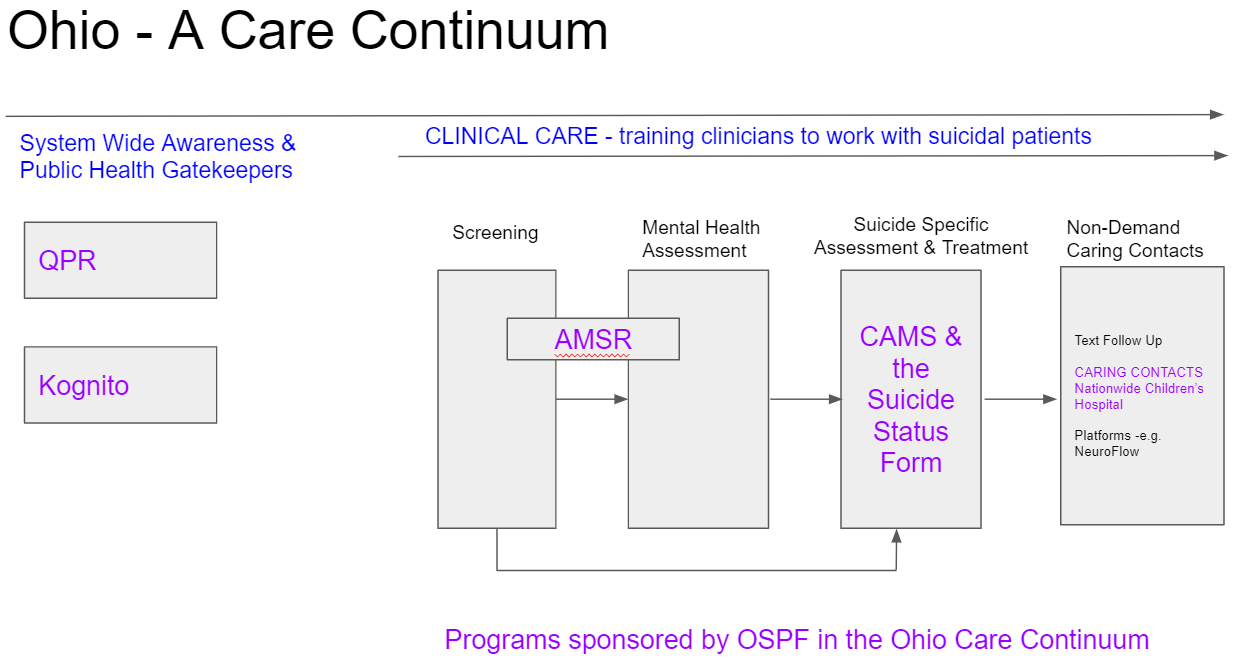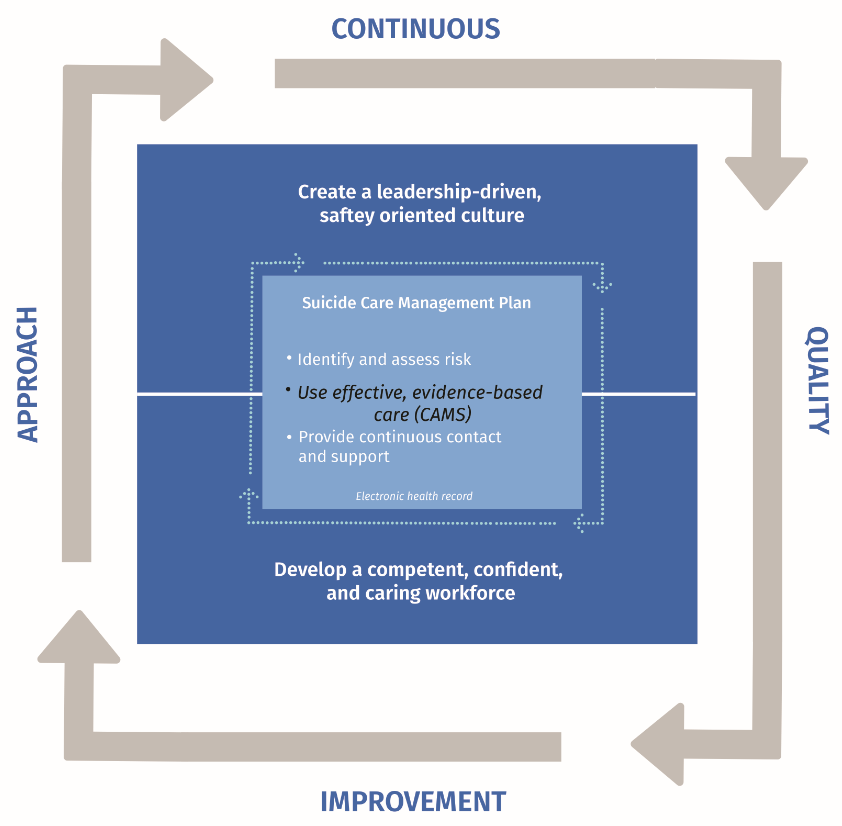While Ohio recently published its official State plan for suicide prevention, the State has been investing in effective, evidence-based practices for many years. Ohio is one of the first states to train over 1,000 clinicians in treating suicidal people, using the evidence-based, suicide-focused Collaborative Assessment and Management of Suicidality (CAMS) FrameworkTM.
The Ohio Suicide Prevention Foundation (OSPF) was formed in 2005 with a mission to reduce the risk of suicide through statewide prevention efforts that support community organizations.
OSPF was awarded a Garrett Lee Smith (GLS) grant from the Substance Abuse and Mental Health Services Administration in 2015, and has applied those funds to a wide range of successful programs in Ohio including:
- Kognito in the school systems to help staff and counselors identify suicidal students and refer them to community-based clinicians
- AMSR (Assessing and Managing Suicide Risk) training in assessing suicidal risk for an average of 300 clinicians and behavioral health experts every year for the last 5 years
- CAMS, to provide those same clinicians a framework and the confidence to reduce clients’ suicidal ideation, stress, and hopelessness in as few as 6 outpatient settings, and
- Caring Contacts, such as the program created by Nationwide Children’s Hospital in Columbus to text non-demand, uplifting messages to recovering patients.
A Care Continuum
It truly takes a system of care to help suicidal patients feel that life is worth living. OSPF’s investments in evidence-based and evidence-informed solutions for each step of this care continuum enable the State to implement a system of care in which communities can identify suicidal sufferers and provide warm handoffs to trained professionals capable of assessing and treating those clients. These best practices are at the heart of a system of care such as Zero Suicide.


Austin Lucas, OSPF’s Program Director, says that “one of the main reasons OSPF selected CAMS five years ago is that suicidal people in Ohio and their families are concerned about hospitalization, preferring instead to be treated in outpatient, private practice settings.” Suicidal people will often avoid seeking help if they feel that they will be put on a hospital hold for a significant period of time.
However, while there are situations for which hospitalization is necessary, most suicidal clients respond well to treatment in as few as 6 sessions of CAMS with a trained clinician. This is an important approach for both the client’s well-being and reducing the costs of suicide prevention.
Many agencies in Ohio have benefited from OSPF’s sponsored CAMS trainings. Annually, OSPF has typically offered seven in-person (and now, with the pandemic, online) CAMS one-day role play trainings. Mr. Lucas says of CAMS that it is the “only treatment model of its kind and the response from clinicians has been very positive.”
The GLS funding has been used to purchase three essential CAMS training elements for clinicians:
- The foundational 3-hour video that provides an introduction and overview of the CAMS Framework™
- The one-day role play training in which clinicians learn techniques for treating suicidal patients and how to complete the Suicide Status Form; and
- supervision calls following the role play training so that clinicians using CAMS with patients have an opportunity to ask questions and discuss cases.
As clinicians in the state complete a free knowledge test, they will achieve the designation of CAMS TRAINED with 10 hours of course work, all available online, and 4 hours of supervision calls with CAMS consultants when working with patients.
Clinician Locator
Having trained over 1,000 clinicians in Ohio, OSPF is in the process of surveying these vital resources with the goal of building a Clinician Locator on its website that will allow suicidal sufferers and their loved ones to find CAMS Trained therapists in their area.
OSPF and CAMS-care, the training company for CAMS, are teaming up in this effort so that therapists in Ohio will be very well represented on the CAMS Clinician Locator that will be available at the end of September 2020.
Drug Overdoses and Suicide
In Ohio, there is a strong correlation between suicides and drug overdoses. A large number of Alcohol, Tobacco and Other Drug (ATOD) counselors have been trained in CAMS.
Ohio has been severely affected by the opioid crisis and OSPF has been able to train these ATOD counselors to combat the opioid and suicide crisis in tandem by bringing the CAMS Framework back to their clinics.
While the Southeastern portion of Ohio has been hit particularly hard, each area of the State has its own unique issues. Training a mental health workforce in various techniques has been OSPF’s way to identify these issues and bring them to the forefront.
Funding & The Future
Since OSPF’s funding from the GLS grant runs out at the end of September 2020, Mr. Lucas and his colleagues are working with other partners to secure funding to carry out the State’s suicide prevention plan going forward.
Much groundwork has been put in place by OSPF. One of the organization’s goals is to find more ways to connect these successful programs so more Ohioans know that these incredible resources exist. What may sound like simple things – a Clinician Locator that school counselors can use to find CAMS Trained clinicians for suicidal students, and making citizens aware that they don’t need to wait for days in an Emergency Department as clinicians are available to treat in outpatient settings – will be important aspects of building awareness in the fight to reduce suicides in Ohio.
The State plans to adopt the Zero Suicide model, which is rapidly becoming the gold standard for suicide prevention. Ohio’s investment in CAMS (which is meets the Zero Suicide model’s standards for evidence-based treatment programs) provides the State with a significant head start on this implementation and will play a critical role in The Suicide Prevention Plan for Ohio’s goal of “reducing the number of suicides every year in the State until not one life is lost.”
About CAMS-care
At CAMS-care, we offer suicide assessment and prevention training, consulting, and resources. For more information on CAMS, please contact us.